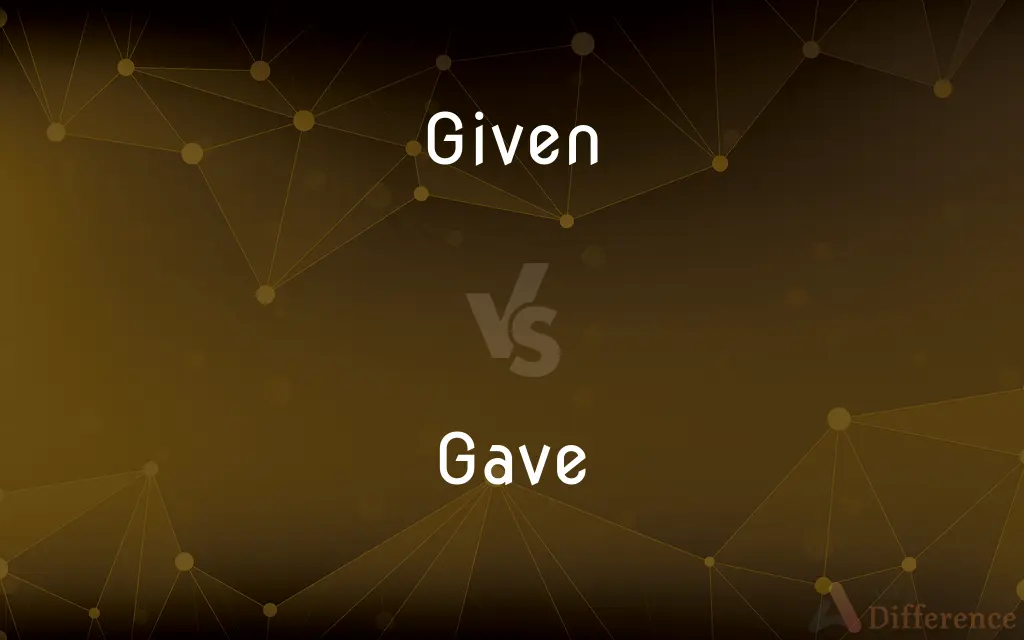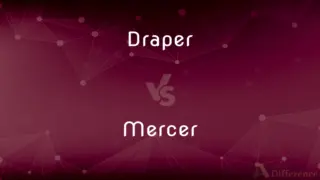Given vs. Gave — What's the Difference?
Edited by Tayyaba Rehman — By Fiza Rafique — Updated on October 25, 2023
"Given" is the past participle of the verb "give" and can also be an adjective implying a specified condition. "Gave" is the simple past tense of "give." While "gave" indicates a past action, "given" often pairs with auxiliary verbs or describes condition

Difference Between Given and Gave
Table of Contents
ADVERTISEMENT
Key Differences
"Given" and "gave" are both derived from the verb "give," but they are used in different tenses and contexts. "Gave" is the simple past form of "give." It indicates an action of giving that happened in the past. For example, in the sentence "She gave him a gift," the action of giving is situated in a past time frame.
On the other hand, "given" serves multiple roles. As the past participle of "give," it's commonly used with auxiliary verbs to form verb tenses, such as the present perfect ("She has given a presentation") or the passive voice ("The award was given to him"). This form is instrumental in providing different shades of meaning related to the action of giving.
Beyond its participial form, "given" can also function as an adjective. In this capacity, it often refers to a specific condition, assumption, or premise. For instance, in the phrase "given the circumstances," it implies "considering" or "taking into account" the mentioned conditions.
Contrarily, "gave" doesn't have such an adjective form and strictly adheres to its role as the simple past form of "give." When choosing between "given" and "gave," one must consider the intended meaning and the sentence's grammatical requirements, distinguishing between a past action and an action with relevance to the present or a specified condition.
Comparison Chart
Grammatical Role
Past participle of "give" and can be an adjective.
Simple past tense of "give."
ADVERTISEMENT
Common Uses
With auxiliary verbs, passive voice, describing conditions.
Describing past actions.
Example Sentence
"She has given her best."
"She gave her best yesterday."
Associated Tenses
Present perfect, past perfect, passive constructions.
Simple past.
Adjectival Use
Can be used as an adjective (e.g., "given situation").
Cannot be used as an adjective.
Compare with Definitions
Given
Determined or influenced by something.
Success is given by one's hard work.
Gave
Indicates a past action of presenting or delivering something.
She gave him a book on his birthday.
Given
Indicating a specific time or age.
Children given the age of 5 can participate.
Gave
Simple past tense of the verb "give."
He gave a wonderful speech.
Given
Past participle form of the verb "give."
She has given much to the community.
Gave
Denotes a past bestowal or conferment.
They gave her the title of 'Manager.'
Given
Used to specify a particular condition or context.
Given his background, he's an expert on the topic.
Gave
Refers to expressing or communicating in the past.
She gave no indication of her plans.
Given
Assumed as a premise or known fact.
Given that it's raining, we'll stay indoors.
Gave
Implies a past surrender or relinquishment.
He gave up his rights to the property.
Given
Past participle of give.
Gave
Past tense of give.
Given
Specified; fixed
We will meet at a given time and location.
Gave
Past participle of give
Given
Granted as a supposition; acknowledged or assumed
Given the condition of the engine, it is a wonder that it even starts.
Given
Having a tendency; inclined
My neighbor is given to lavish spending.
Given
Bestowed as a gift; presented.
Given
Something assumed or taken for granted
"It's a given that the writer of short stories will be keeping his day job" (Donald E. Westlake).
Given
Inflection of give
Given
Considering; taking into account.
Given the current situation, I don't think that's possible.
Given
A condition that is assumed to be true without further evaluation.
When evaluating this math problem, don't forget to read the givens.
Given
Already arranged. en
Given
Currently discussed. en
Given
Particular, specific.
No more than three people can be in that space at a given time.
Given
Assumed as fact or hypothesis.
Given that we will get the resources, what do we want to achieve?
Given
(with to) Prone, disposed.
He was given to taking a couple of glasses of port at his club.
Given
Granted; assumed; supposed to be known; set forth as a known quantity, relation, or premise.
Given
Stated; fixed; as, in a given time.
Given
An assumption that is taken for granted
Given
Specified in advance;
A given number
We will meet at a given time and location
Given
Acknowledged as a supposition;
Given the engine's condition, it is a wonder that it started
Given
Having possession delivered or transferred without compensation
Given
(usually followed by `to') naturally disposed toward;
He is apt to ignore matters he considers unimportant
I am not minded to answer any questions
Common Curiosities
How is "given" used in the present perfect tense?
"Given" pairs with "has" or "have," as in "She has given her all."
Can "gave" be used as an adjective?
No, "gave" cannot function as an adjective.
What is the primary difference between Given and Gave?
"Gave" is the simple past tense of "give," while "given" is its past participle and can also be an adjective.
Does "gave" have a participial form?
No, "gave" is solely the simple past tense form of "give."
In which tense is "gave" primarily used?
"Gave" is used in the simple past tense.
Which word indicates a past action of presenting something: "given" or "gave"?
"Gave" indicates a past action of presenting something.
Can "given" be synonymous with "considering"?
Yes, as in "Given his experience, he should lead the project," where "given" means "considering."
Can "given" be used to describe conditions?
Yes, "given" can describe specific conditions or assumptions, as in "given the circumstances."
Can "given" describe age groups?
Yes, as in "Children given the age of 10 can join."
Is "gave" ever used without an object?
It can be, especially in contexts like "She never gave on her dreams," where "up" is understood.
How can "given" indicate an assumption?
Phrases like "given that" introduce assumptions or premises, as in "Given that he's qualified, he should apply."
Which word is typically paired with auxiliary verbs?
"Given" is often paired with auxiliary verbs, as in "He has given his answer."
What is the passive form using "gave"?
The passive form using the equivalent of "gave" would involve "given," like "The prize was given by her."
Can "given" be used to discuss influence or determination?
Yes, phrases like "Success is given by dedication" imply determination by a factor.
Does "gave" ever appear with "has" or "have"?
No, "has" or "have" are paired with "given" in tenses like the present perfect.
Share Your Discovery

Previous Comparison
Bridge vs. Viaduct
Next Comparison
Draper vs. MercerAuthor Spotlight
Written by
Fiza RafiqueFiza Rafique is a skilled content writer at AskDifference.com, where she meticulously refines and enhances written pieces. Drawing from her vast editorial expertise, Fiza ensures clarity, accuracy, and precision in every article. Passionate about language, she continually seeks to elevate the quality of content for readers worldwide.
Edited by
Tayyaba RehmanTayyaba Rehman is a distinguished writer, currently serving as a primary contributor to askdifference.com. As a researcher in semantics and etymology, Tayyaba's passion for the complexity of languages and their distinctions has found a perfect home on the platform. Tayyaba delves into the intricacies of language, distinguishing between commonly confused words and phrases, thereby providing clarity for readers worldwide.














































